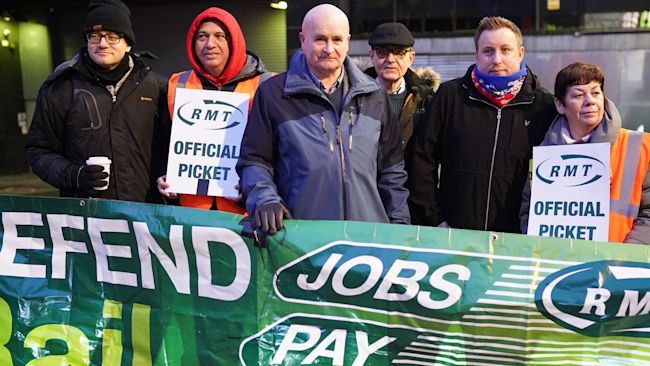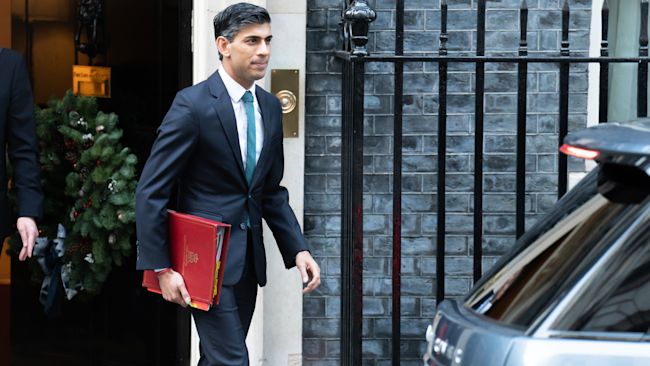Report suggests prime minister's anti-strike legislation could be announced this week.
Graeme Demianyk
05/01/2023

Rishi Sunak during his first major domestic speech of 2023 on Wednesday.
STEFAN ROUSSEAU VIA PA WIRE/PA IMAGES
Rishi Sunak is set to announce new anti-strike laws that will allow employers to sack workers who take industrial action – including teachers and nurses.
In a desperate effort to curb the wave of strikes crippling the UK, the prime minister could bring forward legislation to ensure so-called minimum service levels as early as Thursday in six sectors, including the health service, rail, education, fire and border security, The Times reported.
Strikes would be deemed illegal if trade unions refused to provide the minimum level of service, the newspaper quoted a government source involved in the discussions as saying.
Employers will be able to sue unions and sack workers under the government plans, the report added.
However, a significant pay rise for public sector workers is also reportedly under consideration as a means of ending the strikes, according to the paper.
A source told the paper: “This legislation will remove the legal immunity for strikes where unions fail to implement a minimum level of service. The strikes will be illegal. Ultimately people could be fired for breach of contract.”
The move is unlikely to directly affect the current round of disputes. MPs do not return until next week, and even if the legislation jumps hurdles in the Commons and the Lords, unions are likely to mount a legal challenge.
Sunak last month indicated he wanted to introduce anti-strike laws to protect people’s lives and minimise the disruption on their livelihoods.
The prime minister was asked on Wednesday about the wave of strikes sweeping across the country, replying that his government’s door was always open for dialogue.
He said: “You’ll hear more from the government in the coming days about our approach.
“My view is people should always behave reasonably and fairly and make sure that what we’re doing is centred around what is responsible for the country, what’s affordable for the country.
“I think that’s the right dialogue to be having, and I hope we can have that dialogue.”
He said “people should have the right to strike”, adding “that has to be balanced with the right of the British public to go about their lives without suffering completely undue disruption in the way we’ve seen recently”.
Sunak added: “And that’s why I have said we will introduce new legislation that restores that balance and crucially protects people’s lives as well as their livelihoods.”
Sunak to detail anti-strike laws soon –
Report
Britain has faced a wave of industrial action over the last few months, with strikes crippling various sectors including the rail network set to continue as surging inflation follows more than 10 years of stagnant wage growth.

By: Melvin Samuel
British Prime Minister Rishi Sunak could set out details of a planned new law to curb strikes as soon as Thursday, The Times reported, saying ministers intend to make industrial action illegal in some sectors if minimum service levels are not met.
The Times newspaper said the legislation would enforce minimum service levels in six sectors, including the health service, rail, education, fire and border security, which would require a proportion of union members to continue working.
Britain has faced a wave of industrial action over the last few months, with strikes crippling various sectors including the rail networkset to continue as surging inflation follows more than 10 years of stagnant wage growth.
The strikes would be deemed illegal if unions refused to provide the minimum level of service, the newspaper quoted a government source involved in the discussions as saying.
Employers would be able to sue unions and sack staff under government plans to curb the right to strike, the report added.
The Prime Minister’s office declinedto comment. On Wednesday Sunak said the government would set out its next steps “in the coming days”.
Opposition Labour leader Keir Starmer said if his party won the next election, expected in 2024, it would repeal the law.
“We’ll look at what they bring forward, but if it’s further restrictions, then we will repeal it,” Starmer said during a question and answer session following a speech on Thursday.
“I do not think that legislation is the way that you bring an end to industrial disputes. You have to get in the room and compromise.”
Sunak told Daily Mail in an interview last month the new law would protect people’s lives and minimise the disruption to their livelihoods.
The head of rail union ASLEF, Mick Whelan, told Reuters Britain already had among the worst trade union laws in Europe.
“Surely people have a right to strike. I don’t see any pernicious legislation coming forward to deal with bad employers,” he said.
New TUC boss calls for urgent meeting with Rishi Sunak to break strike deadlock
Wednesday 4 January 2023

The new general secretary of the Trade Union Congress (TUC) has called for an urgent meeting with the prime minister in a bid to break the deadlocked industrial disputes sweeping across the country.
Paul Nowak, who took up his role at the TUC on December 29, called for a change in government direction, saying ministers should open pay negotiations with unions.
It comes as rail workers continue a 48 hour strike, with more stoppages planned this month in the transport industry, NHS and civil service.
In a letter to Rishi Sunak, Mr Nowak said public services were in crisis after years of “underfunding and understaffing.”

He wrote: “We can’t solve these problems without a fair deal for the people on the frontline.
“Every month experienced employees are quitting, with one in three public service staff now taking steps to leave their professions or actively considering it. This is simply unsustainable.
“But we cannot fix the staffing crisis in our schools, hospitals and elsewhere if we do not fix the underlying causes.
“That means talking in an open and constructive way about improving public sector pay. But so far your ministers have refused to negotiate directly about pay with unions.”
New TUC leader says 'ball is in government's court' to put an end to strikes
Mr Nowak said unions worked closely with Mr Sunak during the pandemic to deliver the furlough scheme and protect millions of jobs.“That’s the kind of mature approach we need now," he continued.
“Unions have already made clear their willingness to sit down with the government and talk about boosting pay. But while your ministers continue to refuse point blank to discuss improving wages, there can be no resolution.

“In the NHS, for example, appropriate structures already exist to allow the immediate start of pay negotiations involving health unions, employers and ministers. This was exactly what happened in 2018, leading to the three-year wage deal.
“We want to find a resolution to the current disputes so our public service staff can get on with doing the jobs they love. And so our public services can start to improve for everyone who relies on them.”
Around half of Britain’s railway lines are closed and only a fifth of services are running as tens of thousands of workers at Network Rail and train operators walk out on the second day of the strike, with another to begin on Friday.
On Wednesday, the DVSA driving examiners’ strike starts in London, the South East, South Wales and the South West, while traffic officer service workers at National Highways will continue their walkout.
Who is striking when? A timeline of public sector walkouts in January 2023
Meanwhile, industrial action by the UK-wide National Highways and Rural Payments Agency staff will continue.
London bus workers at Abellio will also begin a two-day strike – the first in a series of action planned by the group throughout January.
More industrial action is planned later in the month by workers in the transport sector, along with staff in the NHS and civil service.
Workers have lost £20,000, on average, in real wages since 2008 as a result of pay not keeping up with inflation, and by 2025 the loss will total £24,000, according to TUC analysis.Nurses have lost £42,000 in real earnings since 2008, midwives £56,000 and paramedics £56,000, with workers facing another year of "pay misery", said the TUC.
The government argues it has agreed to the recommendations made by independent pay review bodies and that double digit pay rises would push inflation up further.
No comments:
Post a Comment